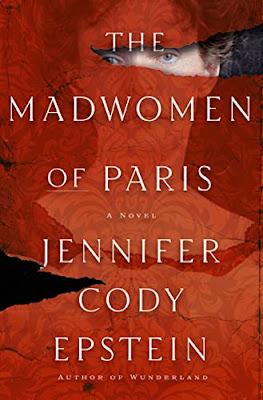Laure had been a patient of the Hysterical ward at Paris's famous Salpêtrière asylum. Having been cured of her hysteria but making money or family, she stayed on as a ward attendant. One of her main duties is to be a personal assistant to the star of Charcot's Friday lectures. When Josephine is dragged into the asylum fighting like a banshee and covered in blood, something piques Laure's interest.
Amazon affiliate links are used on this site. A free book was provided for an honest review.
 |
| July 2023; Ballantine Books; 978-0593158005 audio, ebook, print (336 pages); historical fiction |
I read Maya Rodale's The Mad Girls of New York last year and was intrigued by the mental health system of the 1800s. So I picked up The Madwomen of Paris as it is also set in the 1880s.
The U.S. women were "diagnosed" with hysteria when defiant, independent, and outspoken women could no longer be accused of being witches. It was easy for men to have women who didn't "know their place" committed to an insane asylum.
The women committed to Salpêtrière with hysteria in this book though seem to have true mental health issues. Most seem to be suffering from post-traumatic stress - usually as the result of being sexually assaulted. They have real physical ailments - seizures and permanently contracted muscles. During this period of time, there was an epidemic of hysteria sweeping through Paris. It mostly affected women, but Charcot, who was a pioneer in the field of neurology (before the term was widely used), proved that men could also be affected.
The historical information is very fascinating. I spent several minutes (on more than one occasion) going down rabbit holes through googling hysteria and Charcot. There are a number of neurological diseases and disorders named after the doctor. He described Parkinson's Disease and ASL (aka Lou Gehrig's disease) and determined that multiple sclerosis was caused by lesions in the brain. While he did much to advance the field of neurology it was not a recognized field during his time. He was a pathologist.
The story of Laure and Josephine was okay. I didn't care for the "romance" between them as it goes beyond just feelings to some descriptive interactions though mild. Their growing affection and emotional intimacy would have been fine for the story (if you read my reviews, you will note that I ding books with heterosexual couples with too much descriptive romance).
I was more drawn to the scenes with Charcot and his experiments with hysteric patients - which would likely not pass an ethics review today. The scenes were as fascinating as they were appalling - it was like a train wreck that you can't look away from. For all his greatness, Charcot was not shown in a favorable light in this novel. This was true in real life as his work with hypnosis and hysteria was coming under stronger scrutiny.
If you enjoy medical history, then there is enough in this book to keep you interested.
Buy The Madwomen of Paris at Amazon
Donna Huber is an avid reader and natural encourager. She is the founder of Girl Who Reads and the author of how-to marketing book Secrets to a Successful Blog Tour.
Enjoyed this post? Never miss out on future posts by following us. Get even more book news in your inbox, sign up for our newsletter today! Girl Who Reads is an Amazon advertising affiliate; a small commission is earned when purchases are made at Amazon using any Amazon links on this site. Thank you for supporting Girl Who Reads.

.png)



















0 comments:
Post a Comment